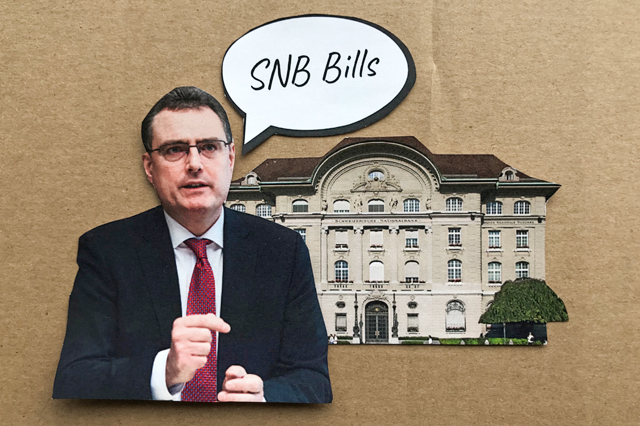How the Swiss National Bank will raise interest rates

Voices in Switzerland criticising the monetary policy of the Swiss National Bank (SNB) are getting louder. In particular, many economists consider negative interest rates – reserved for the worst crises – increasingly absurd. Yet raising interest rates is not without risks. A cunning plan is needed – and fortunately one exists.
The last time the SNB raised interest rates was back in 2007. And it will do it again, probably in 2020. But the question is not when but how, since it will be complicated.
Fabio CanetgExternal link is a macroeconomist at the University of Bern. He wrote this article with the support of Daniel Kaufmann.
Before the financial crisis of 2007-2008, the SNB guided interest rates with so-called repurchase agreements (repos). These instruments were effective because commercial banks were in a structural liquidity deficit. This means that banks had to borrow money from the SNB to fulfil their minimum reserve requirements. The price of money, the interest rate, was determined by the national bank.
The SNB had full control over money market interest rates because it kept liquidity scarce. Nowadays, however, banks hold massive amounts of excess liquidity due to the SNB’s foreign exchange interventions. Repos can thus no longer be used to steer interest rates.
The most likely instrument the SNB will use to raise interest rates one day are SNB bills. These are national bank bonds, interest-bearing securities.
What does this solution have going for it? SNB officials, including its president Thomas Jordan, have repeatedly mentioned SNB bills as a possible tool for normalising monetary policy. Already in 2009 Jordan said “SNB bills will take on an important function in the transition […] to a regular management of interest rates”.
In discussions of the pros and cons of the various instruments, those close to the bank’s governing board often point to the benefits of SNB bills, for example their transferability to third parties, including non-banks.
What’s more, the SNB already has practical experience of issuing SNB bills. Between 2008 and 2011, more than CHF120 billion ($120 billion) were outstanding to control the money supply.
Since then the SNB has repeatedly issued SNB bills “as part of test operations”, according to its annual reports.
From interest-free to interest-nearing
But how do such bills work? In general, banks would like to get rid of their excess liquidity because this yields no or even negative interest. But because all banks are in the same boat, this is not possible among one another.
Issuing SNB bills presents an attractive investment option for the national bank. Interest-free reserves can be exchanged for interest-bearing bills.
If commercial banks swap reserves for SNB bills, there’s less excess liquidity in the banking system. This shortage leads to a higher money market interest rate.
Of greater importance, however, is the fact that because the banks can invest their money at an interest rate chosen by the SNB, they will no longer be prepared to loan the same money to other banks at a lower rate. As a result, the level of interest rates goes up.
That said, technical and political challenges remain which need to be overcome in connection with the policy normalisation. Among other things, the SNB has to explain to the Swiss public why it will be necessary to pay interest to banks in order to raise interest rates.
But the question of how the national bank will one day raise interest rates is in all likelihood already answered.

More
Patience wearing thin for negative interest rates
(Translated from German by Thomas Stephens)

In compliance with the JTI standards
More: SWI swissinfo.ch certified by the Journalism Trust Initiative




You can find an overview of ongoing debates with our journalists here. Please join us!
If you want to start a conversation about a topic raised in this article or want to report factual errors, email us at english@swissinfo.ch.